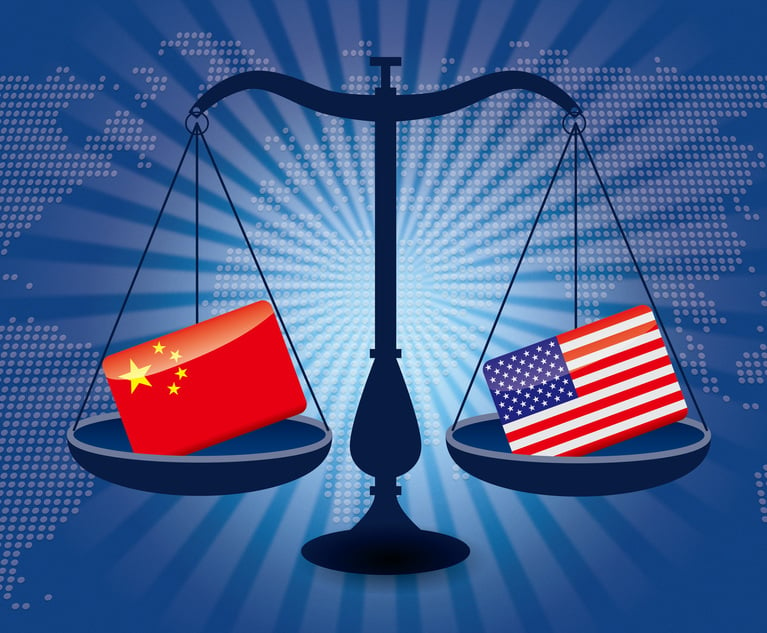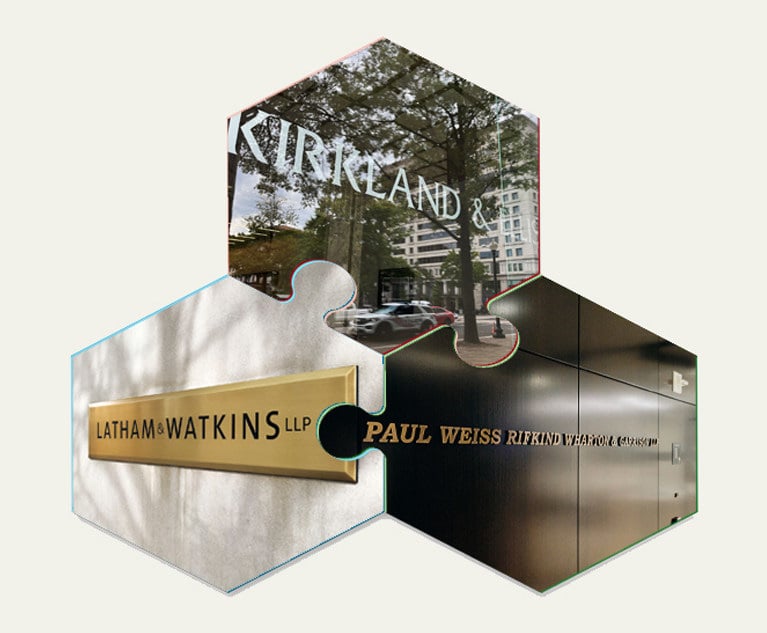The Legal Industry's Existential Doubts Go Beyond the Coronavirus
Across the legal industry, firms and lawyers alike are tangling with questions about their broader purpose. Where will the search for answers lead them?
May 13, 2020 at 01:00 AM
4 minute read
The original version of this story was published on The American Lawyer
 Credit: bizvector/Shutterstock.com
Credit: bizvector/Shutterstock.com
Even before the coronavirus began to spread, some law firms were experiencing an existential crisis of a different sort.
"What is our purpose?" firm leaders are asking. Across the U.K., business development teams are spending hours brainstorming how to define a firm's reason for being. Over their coffee, younger lawyers are pondering whether their firms offer something deeper.
What they are essentially asking is whether, aside from providing legal advice and making money from it, corporate and commercial law firms can and should offer anything to wider society. It is a way for them to join the debate about the socially destructive side of capitalism and feels particularly relevant given the global effects of the pandemic.
Leaders of U.K. firms frequently raise the topic, which is laudable. But coming up with an answer and putting it into practice is less straightforward.
Various firms are hoping to define themselves as diversity champions. Some are particularly proud of the pro bono work they do. One management team at a large international firm is thinking of donating a portion of its profits to charity. One U.K. firm has had discussions about whether supporting worthy causes should be optional or not.
Late last year, five law firms—Eversheds Sutherland, Goodwin Procter, Nixon Peabody, Orrick, Herrington & Sutcliffe, and Stoel Rives—along with dozens of general counsel, launched a $5 million fund to help improve diversity in the legal industry.
In February, lawyers at Allen & Overy, Clifford Chance and Slaughter and May were among a group of 63 firms and organizations that worked together to launch new model contracts and laws aiming to help businesses fight climate change.
These are undoubtedly good things, but what about what each law firm stands for? Many firms want central values that dictate their aim to make the world a better place.
One large U.K. firm has spent the best part of a year devising a plan to turn itself into a "purpose-driven law firm." Unfortunately—perhaps inevitably—the list of bullet points it has agreed on as its purpose is slightly vague and predictable. It argues that its slogans were agreed on by the firm's entire partnership and lawyers, meaning everyone is fully on board with them. But it is hard to imagine any great change coming from a term such as "making business work better for people."
Another firm recently came up with the school-style slogan: "to enable our clients and our people to shape the world's possibilities."
Then again, at least those firms are trying. Like every firm discussing this topic, it is facing the same challenge that has always existed: how a benevolent motive fits alongside law firms' remuneration structure, which encourages little retention of capital and needs to maintain high salaries to remain competitive.
Despite these issues, the industry is wise to be taking this question seriously. The push to find a purpose is in part to appease an incoming generation of lawyers who are taking a lot more interest in these topics than their predecessors did. The battle for talent is not just about salaries, which are already sky-high. Lawyers want to feel like they work in a place that thinks about the outside world, not just its profits.
Clients are also driving change. Swiss pharmaceutical company Novartis recently said it would withhold 15% of billed time payments if its advisers fail to comply with its diversity and inclusion requirements. Lawyers say it is becoming essential to turn up to pitches with more than just evidence of expertise. To gain a competitive edge, they are being asked to show they think more widely about their role in the world.
And because some firms are making noises about such things, everyone else feels the need to do the same. Funds for diversity, cross-firm climate change initiatives and charity donations are just the start of it. Expect a flood of slogans and corporate social responsibility efforts in the coming years. It's far less clear, though, whether any of it can ultimately answer the questions about purpose lingering in the minds of many.
Email: [email protected]
This content has been archived. It is available through our partners, LexisNexis® and Bloomberg Law.
To view this content, please continue to their sites.
Not a Lexis Subscriber?
Subscribe Now
Not a Bloomberg Law Subscriber?
Subscribe Now
NOT FOR REPRINT
© 2025 ALM Global, LLC, All Rights Reserved. Request academic re-use from www.copyright.com. All other uses, submit a request to [email protected]. For more information visit Asset & Logo Licensing.
You Might Like
View All
As American Firms Retreat, Will Loyal UK Firms Regain Asia Market Share?

DeepSeek’s AI Power Move: Will Lawyers Be the Next to Adapt or Perish?
6 minute read
Now That the Trump Era Has Begun, Change Is Coming. For Big Law, Change Is Already Here
6 minute readLaw Firms Mentioned
Trending Stories
- 1Data Breaches in UK Legal Sector Surge, According to ICO Data
- 2PayPal Faces New Round of Claims; This Time Alleging Its 'Honey' Browser Extension Cheated Consumers
- 3Fired NLRB Member Seeks Reinstatement, Challenges President's Removal Power
- 4NY Inspector General Announces Attorneys Hired to Lead Upstate Region and Gaming
- 5Carol-Lisa Phillips to Rise to Broward Chief Judge as Jack Tuter Weighs Next Move
Who Got The Work
J. Brugh Lower of Gibbons has entered an appearance for industrial equipment supplier Devco Corporation in a pending trademark infringement lawsuit. The suit, accusing the defendant of selling knock-off Graco products, was filed Dec. 18 in New Jersey District Court by Rivkin Radler on behalf of Graco Inc. and Graco Minnesota. The case, assigned to U.S. District Judge Zahid N. Quraishi, is 3:24-cv-11294, Graco Inc. et al v. Devco Corporation.
Who Got The Work
Rebecca Maller-Stein and Kent A. Yalowitz of Arnold & Porter Kaye Scholer have entered their appearances for Hanaco Venture Capital and its executives, Lior Prosor and David Frankel, in a pending securities lawsuit. The action, filed on Dec. 24 in New York Southern District Court by Zell, Aron & Co. on behalf of Goldeneye Advisors, accuses the defendants of negligently and fraudulently managing the plaintiff's $1 million investment. The case, assigned to U.S. District Judge Vernon S. Broderick, is 1:24-cv-09918, Goldeneye Advisors, LLC v. Hanaco Venture Capital, Ltd. et al.
Who Got The Work
Attorneys from A&O Shearman has stepped in as defense counsel for Toronto-Dominion Bank and other defendants in a pending securities class action. The suit, filed Dec. 11 in New York Southern District Court by Bleichmar Fonti & Auld, accuses the defendants of concealing the bank's 'pervasive' deficiencies in regards to its compliance with the Bank Secrecy Act and the quality of its anti-money laundering controls. The case, assigned to U.S. District Judge Arun Subramanian, is 1:24-cv-09445, Gonzalez v. The Toronto-Dominion Bank et al.
Who Got The Work
Crown Castle International, a Pennsylvania company providing shared communications infrastructure, has turned to Luke D. Wolf of Gordon Rees Scully Mansukhani to fend off a pending breach-of-contract lawsuit. The court action, filed Nov. 25 in Michigan Eastern District Court by Hooper Hathaway PC on behalf of The Town Residences LLC, accuses Crown Castle of failing to transfer approximately $30,000 in utility payments from T-Mobile in breach of a roof-top lease and assignment agreement. The case, assigned to U.S. District Judge Susan K. Declercq, is 2:24-cv-13131, The Town Residences LLC v. T-Mobile US, Inc. et al.
Who Got The Work
Wilfred P. Coronato and Daniel M. Schwartz of McCarter & English have stepped in as defense counsel to Electrolux Home Products Inc. in a pending product liability lawsuit. The court action, filed Nov. 26 in New York Eastern District Court by Poulos Lopiccolo PC and Nagel Rice LLP on behalf of David Stern, alleges that the defendant's refrigerators’ drawers and shelving repeatedly break and fall apart within months after purchase. The case, assigned to U.S. District Judge Joan M. Azrack, is 2:24-cv-08204, Stern v. Electrolux Home Products, Inc.
Featured Firms
Law Offices of Gary Martin Hays & Associates, P.C.
(470) 294-1674
Law Offices of Mark E. Salomone
(857) 444-6468
Smith & Hassler
(713) 739-1250









